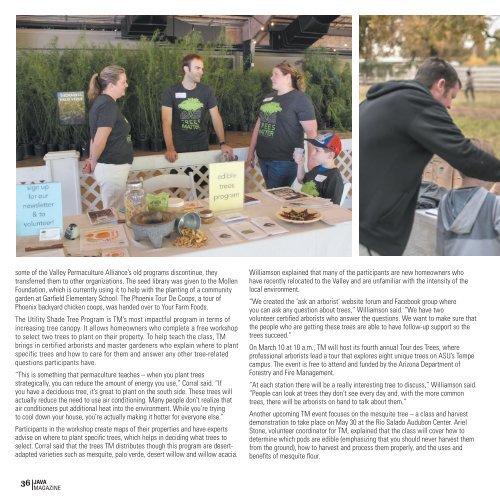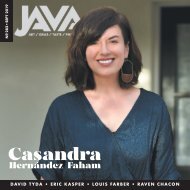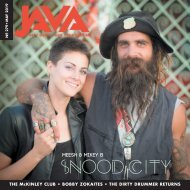You also want an ePaper? Increase the reach of your titles
YUMPU automatically turns print PDFs into web optimized ePapers that Google loves.
some of the Valley Permaculture Alliance’s old programs discontinue, they<br />
transferred them to other organizations. The seed library was given to the Mollen<br />
Foundation, which is currently using it to help with the planting of a community<br />
garden at Garfield Elementary School. The Phoenix Tour De Coops, a tour of<br />
Phoenix backyard chicken coops, was handed over to Your Farm Foods.<br />
The Utility Shade Tree Program is TM’s most impactful program in terms of<br />
increasing tree canopy. It allows homeowners who complete a free workshop<br />
to select two trees to plant on their property. To help teach the class, TM<br />
brings in certified arborists and master gardeners who explain where to plant<br />
specific trees and how to care for them and answer any other tree-related<br />
questions participants have.<br />
“This is something that permaculture teaches – when you plant trees<br />
strategically, you can reduce the amount of energy you use,” Corral said. “If<br />
you have a deciduous tree, it’s great to plant on the south side. These trees will<br />
actually reduce the need to use air conditioning. Many people don’t realize that<br />
air conditioners put additional heat into the environment. While you’re trying<br />
to cool down your house, you’re actually making it hotter for everyone else.”<br />
Participants in the workshop create maps of their properties and have experts<br />
advise on where to plant specific trees, which helps in deciding what trees to<br />
select. Corral said that the trees TM distributes though this program are desertadapted<br />
varieties such as mesquite, palo verde, desert willow and willow acacia.<br />
Williamson explained that many of the participants are new homeowners who<br />
have recently relocated to the Valley and are unfamiliar with the intensity of the<br />
local environment.<br />
“We created the ‘ask an arborist’ website forum and Facebook group where<br />
you can ask any question about trees,” Williamson said. “We have two<br />
volunteer certified arborists who answer the questions. We want to make sure that<br />
the people who are getting these trees are able to have follow-up support so the<br />
trees succeed.”<br />
On <strong>March</strong> 10 at 10 a.m., TM will host its fourth annual Tour des Trees, where<br />
professional arborists lead a tour that explores eight unique trees on ASU’s Tempe<br />
campus. The event is free to attend and funded by the Arizona Department of<br />
Forestry and Fire Management.<br />
“At each station there will be a really interesting tree to discuss,” Williamson said.<br />
“People can look at trees they don’t see every day and, with the more common<br />
trees, there will be arborists on hand to talk about them.”<br />
Another upcoming TM event focuses on the mesquite tree – a class and harvest<br />
demonstration to take place on May 30 at the Rio Salado Audubon Center. Ariel<br />
Stone, volunteer coordinator for TM, explained that the class will cover how to<br />
determine which pods are edible (emphasizing that you should never harvest them<br />
from the ground), how to harvest and process them properly, and the uses and<br />
benefits of mesquite flour.<br />
36 <strong>JAVA</strong><br />
MAGAZINE


















